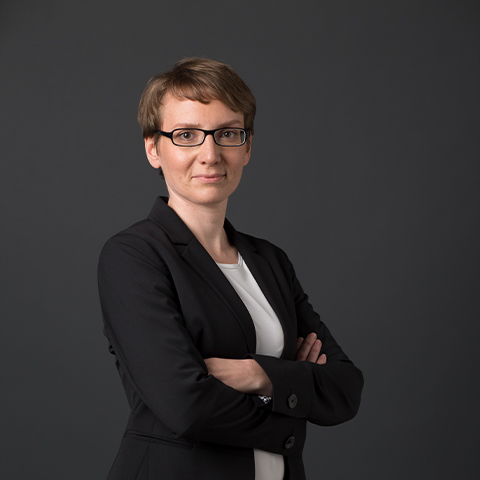More than just a degree
Our team
Dr. Silke Heuse is the Programme Leader for Psychology and Vice Dean for the Business department at the University of Europe for Applied Sciences, Hamburg Campus.

Prof. Dr. Silke Heuse
Professor Heuse, Head of the psychology programme and Vice Dean for the Business department at UE in Hamburg bring to the department expertise in health psychology, environmental psychology, and business psychology for the prevention of mental and physical illness using behavioural therapy methods to educate about mental illness and its risk factors. It also supports and evaluates projects using data collection and analysis methods (quantitative and qualitative).
- Health psychology services for the prevention of mental and physical illnesses
- Business psychology with a focus in organizational health management
- Environmental psychology with a focus on planetary health
- Methodology with workshops and scientific monitoring of projects
- Psychological psychotherapist with focus on behavioral therapy
2024
Heuse, S., Willkommen, S. & von Wissmann, I. (2024). Eco-Stress und seine Rolle für das Umweltschutzverhalten von Erwachsenen in Deutschland. Zeitschrift für Umweltpsychologie, 27(2), 296-311.
2022
Domke, A., Keller, J., Knoll, N., Sniehotta, F. F., Heuse, S., & Wiedemann, A. U. (2022). Plan pursuit in the context of daily fruit and vegetable consumption: The importance of cue detection and the execution of the planned behaviour for overall behaviour change. British Journal of Health Psychology, 13(2), 377-393. DOI:10.1111/bjhp.12593
Heuse, S., Grebe, J. & Esken, F. (2022). Sleep hygiene behaviour in students: An intended strategy to cope with stress?? Journal of Medical Psychology, 24, 23–28. DOI: 10.3233/JMP-220038
Heuse, S. & Risius, U.-M. (2022). Stress bei Studierenden mit und ohne Nebenjob - Welche Rolle spielen Stress-Mindsets? Prävention und Gesundheitsförderung 17, 379–384. DOI: 10.1007/s11553-021-00895-0
2021
Domke, A., Keller, J., Heuse, S., Wiedemann, A., Lorbeer, N., & Knoll, N. (2021). Immediate effects of a very brief planning intervention on fruit and vegetable consumption: A randomized controlled trial. Applied Psychology: Health and Well-Being, 13(2), 377-393. DOI: 10.1111/aphw.12254
2020
Fodor, D. P., Pohrt, A., Gekeler, B. S., Knoll, N., & Heuse, S. (2020-epub). Intensity matters: The role of physical activity in the job demands-resources model. Journal of Work and Organizational Psychology. doi: 10.5093/jwop2020a21 (IF 1.565).
Heuse, S., Dietze, C., Fodor, D., & Voltmer, E. (2020-pre-press). Understanding stress experiences of health care students - a survey study on demands and resources in education. Journal of Medical Psychology, 1-7. doi: 10.3233/JMP-200024
Heuse, S., Gekeler, B., & Fodor, D. (2020-accepted). The Role of Physical Exercise as Personal Resource Against Job Stress. International Journal of Occupational Safety and Economics. doi: 10.1080/10803548.2020.1732648 (IF 1,377).
Heuse, S., Willkommen, S. & von Wissmann, I. (2024). Eco-Stress und seine Rolle für das Umweltschutzverhalten von Erwachsenen in Deutschland. Zeitschrift für Umweltpsychologie, 27(2), 296-311.
2022
Domke, A., Keller, J., Knoll, N., Sniehotta, F. F., Heuse, S., & Wiedemann, A. U. (2022). Plan pursuit in the context of daily fruit and vegetable consumption: The importance of cue detection and the execution of the planned behaviour for overall behaviour change. British Journal of Health Psychology, 13(2), 377-393. DOI:10.1111/bjhp.12593
Heuse, S., Grebe, J. & Esken, F. (2022). Sleep hygiene behaviour in students: An intended strategy to cope with stress?? Journal of Medical Psychology, 24, 23–28. DOI: 10.3233/JMP-220038
Heuse, S. & Risius, U.-M. (2022). Stress bei Studierenden mit und ohne Nebenjob - Welche Rolle spielen Stress-Mindsets? Prävention und Gesundheitsförderung 17, 379–384. DOI: 10.1007/s11553-021-00895-0
2021
Domke, A., Keller, J., Heuse, S., Wiedemann, A., Lorbeer, N., & Knoll, N. (2021). Immediate effects of a very brief planning intervention on fruit and vegetable consumption: A randomized controlled trial. Applied Psychology: Health and Well-Being, 13(2), 377-393. DOI: 10.1111/aphw.12254
2020
Fodor, D. P., Pohrt, A., Gekeler, B. S., Knoll, N., & Heuse, S. (2020-epub). Intensity matters: The role of physical activity in the job demands-resources model. Journal of Work and Organizational Psychology. doi: 10.5093/jwop2020a21 (IF 1.565).
Heuse, S., Dietze, C., Fodor, D., & Voltmer, E. (2020-pre-press). Understanding stress experiences of health care students - a survey study on demands and resources in education. Journal of Medical Psychology, 1-7. doi: 10.3233/JMP-200024
Heuse, S., Gekeler, B., & Fodor, D. (2020-accepted). The Role of Physical Exercise as Personal Resource Against Job Stress. International Journal of Occupational Safety and Economics. doi: 10.1080/10803548.2020.1732648 (IF 1,377).
2016
Peter Jacobi Prize of the German Society for Medical Psychology (research award)
2009
Marie Schlei Prize, Department of Psychology and Educational Sciences, Free University of Berlin (doctoral award).
Poster awards at national and international congresses in 2003, 2015 and 2019.
Peter Jacobi Prize of the German Society for Medical Psychology (research award)
2009
Marie Schlei Prize, Department of Psychology and Educational Sciences, Free University of Berlin (doctoral award).
Poster awards at national and international congresses in 2003, 2015 and 2019.